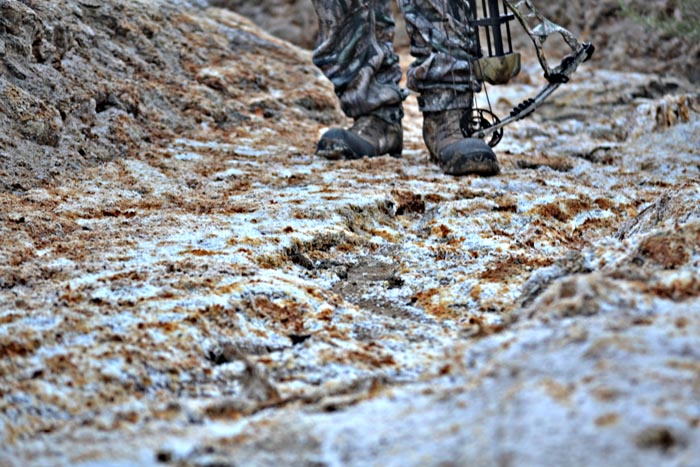

by Pat McHugh
With deer hunting, turkey hunting, predator hunting, trapping season and a slew other fall outdoors activities upon us, it's important to review survival plans in case things take a turn for the worst. Here are some wilderness survival tips for hunting season.
Personal Safety for Wilderness Survival
* Know the area you're going to hunt. If possible, scout the area before the hunt.
* Leave an itinerary, with someone responsible of exactly where you are going and when you expect to return. Leave a map and draw a circle around your anticipated hunting area.
* Put together and carry with you at all times a portable, personal survival kit.
Preparing a Vehicle for Wilderness Survival
* Make sure your vehicle is in good mechanical condition, proper tire inflation and a spare with a jack.
* Carry a shovel, axe; tire chains, jumper cables, sand or grit and a tow chain in your vehicle.
* If you have problems with your vehicle or become snowed in, stay with your vehicle — don't leave it.
While In the Field
* Avoid hunting alone. If you do, make sure others know of your plans.
* Be aware of other hunters, people walking or living or domestic animals in your hunting area.
* Wear or bring proper clothing for the area you hunt, remember weather is unpredictable.
* If not mandatory, wear at least 400 square inches of hunter orange on your back, chest and/or head.
Field Dressing Your Animal
* Use a very sharp knife. A sharp knife cuts easier, quicker and with less pressure.
* Always cut away from you — never draw a knife blade towards you. Make sure you can see the cut.
Be Aware of Your Physical Condition
* Know your physical limitations and don't exceed them.
* Be prepared for weather changes by dressing in layers. Dressing in layers allows you to regulate your body temperature by adding or removing clothes as needed.
* Drink plenty of water. You can become dehydrated, even in cold weather.
* Hypothermia (the loss of body temperature) can occur in temperatures as warm as 50 degrees. Be aware of hypothermia signs. The first is stumbling or disorientation. When you cannot pull your thumb into your index finger is another. When you notice any of these signs, or you are shivering, sit down immediately and build a fire to get yourself warm and dry.
* Frostbite. If hunting in cold weather, be aware of frostbite development. White spots on your skin are the first sign. Check your face, nose, ears, feet and hands regularly.
If You Become Lost
* The best wilderness survival tip is to not panic. Sit down and build a fire, even if it isn't cold. A fire is soothing and will help you to relax, focus your mind and help you think clearly. After calming down, try to get your bearings and think your way out of the situation. Do not panic.
* If you think you know the direction you need to travel, use the pad of paper and pencil from your survival kit and leave a note at your location, indicating who you are and the direction you're traveling. If you come across others as you're trying to find your way out, don't be embarrassed to stop them and ask for directions and help.
* If you're unsure about the direction you should travel, stay at your camp and build a shelter before sundown, if possible. Build a smoky fire (which can be spotted from the air) or preferably build three small fires in a triangle (a air recognized distress signal and if you sit in the middle you will be warmer than you will be from one large fire). “You can live without food and water for several days, so do not panic.
Alcohol in Wilderness Survival Situations
* Do not give alcohol to someone who's cold. Rather than warming the person, alcohol will actually make them loose more body heat.
* It's never a good idea to mix alcohol and hunting in the first place. Drinking it in a wilderness survival situation shouldn't even be an option. If you're looking for a portable disinfectant, use pre-packaged alcohol wipes for cleaning wounds.
This is not a full and comprehensive list for wilderness survival preparation. Use your experience and employ a little common sense to expand on these thoughts.
Your Turn: What Survival Items Do You Bring on a Hunt?
What items do you keep with you during a hunt in case wilderness survival becomes a reality? Leave a comment below.


![Best Concealed Carry Guns In 2025 [Field Tested] Wilson Combat EDC X9S 1](https://gundigest.com/wp-content/uploads/Wilson-Combat-EDC-X9S-1-324x160.jpg)


![Best 9mm Carbine: Affordable PCCs [Tested] Ruger Carbine Shooting](https://gundigest.com/wp-content/uploads/Ruger-Carbine-Shooting-100x70.jpg)
![Best AR-15: Top Options Available Today [Field Tested] Harrington and Richardson PSA XM177E2 feature](https://gundigest.com/wp-content/uploads/Harrington-and-Richardson-PSA-XM177E2-feature-100x70.jpg)
